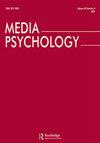Social Scripts and Expectancy Violations: Evaluating Communication with Human or AI Chatbot Interactants
IF 2.6
2区 心理学
Q1 COMMUNICATION
引用次数: 6
Abstract
ABSTRACT As artificial intelligence (AI) agents like chatbots play larger roles in daily life, questions arise regarding how people evaluate their communication. Perspectives applying communication scripts to human-AI interactions propose that outcomes are determined by messages and the embedded cues therein. The expectancy violations perspective posits that message characteristics are less important than whether they are expected or unexpected. A pilot study established baseline expectancies about humans’ and chatbots’ conversational contingency and response latencies. A 2 (contingency: more/less contingent responses) × 2 (latency: fast/slow responses) × 2 (communicator identity: human/chatbot) experiment then tested predictions derived from human-human communication scripts and expectancy violations using textual variations in an e-commerce chat. Communicators showing greater conversational contingency and faster responses were most credible, whether they were human or chatbots, but chatbots were consistently less socially attractive than humans. Results show that humans and chatbots are evaluated similarly regarding the functional, but not the relational aspects of communication. There was greater support for the communication script perspective than the expectancy violations perspective regarding interactions with chatbots.社会脚本和期望违反:评估与人类或人工智能聊天机器人互动的沟通
随着聊天机器人等人工智能(AI)代理在日常生活中发挥越来越大的作用,人们如何评估自己的沟通也出现了问题。将交流脚本应用于人类与人工智能交互的观点认为,结果是由信息和其中嵌入的线索决定的。期望违反透视图假定消息特征的重要性低于它们是预期的还是非预期的。一项试点研究建立了关于人类和聊天机器人的会话偶然性和响应延迟的基线预期。然后,一个2(偶然性:偶然性反应多/少)x2(延迟:快速/缓慢反应)x2(通信者身份:人类/聊天机器人)实验测试了从人类通信脚本中得出的预测,以及使用电子商务聊天中的文本变化的期望违反。无论是人类还是聊天机器人,表现出更大的对话偶然性和更快的反应的沟通者都是最可信的,但聊天机器人的社交吸引力始终不如人类。结果表明,人类和聊天机器人在功能方面的评估相似,但在沟通的关系方面则不同。在与聊天机器人的交互方面,通信脚本透视图比期望违反透视图得到了更大的支持。
本文章由计算机程序翻译,如有差异,请以英文原文为准。
求助全文
约1分钟内获得全文
求助全文
来源期刊

Media Psychology
Multiple-
CiteScore
8.60
自引率
7.10%
发文量
30
期刊介绍:
Media Psychology is an interdisciplinary journal devoted to publishing theoretically-oriented empirical research that is at the intersection of psychology and media communication. These topics include media uses, processes, and effects. Such research is already well represented in mainstream journals in psychology and communication, but its publication is dispersed across many sources. Therefore, scholars working on common issues and problems in various disciplines often cannot fully utilize the contributions of kindred spirits in cognate disciplines.
 求助内容:
求助内容: 应助结果提醒方式:
应助结果提醒方式:


